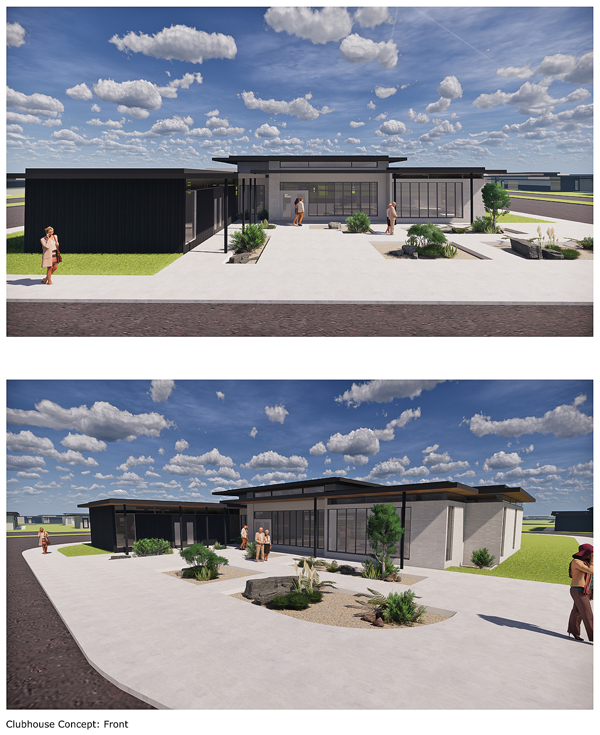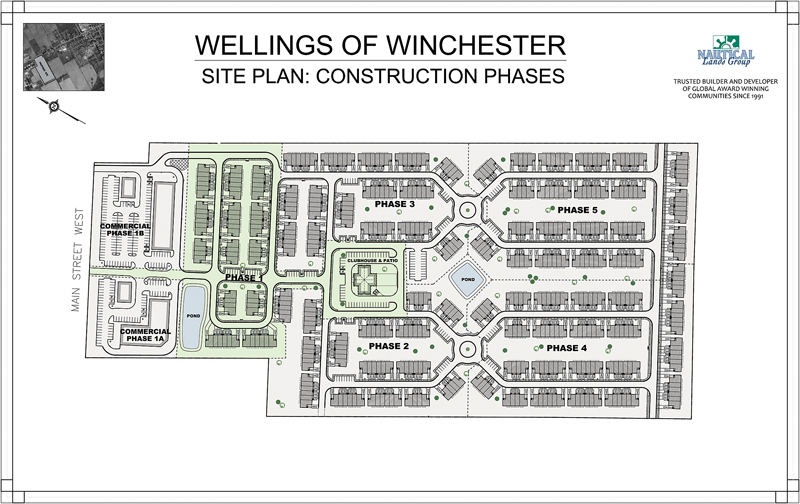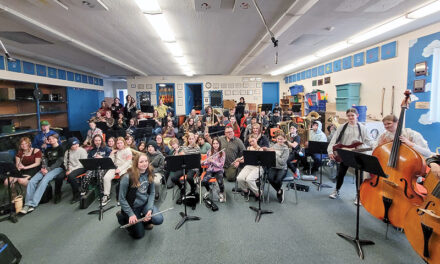Construction on phase one of the Wellings of Winchester development could begin in the spring. This is the site plan for the seniors community. Courtesy photo, Nautical Lands Group

A conceptual drawing of the clubhouse, intended to be a hub for the Winchester community as well as an activity centre for Wellings’ residents. Courtesy photo, Nautical Lands Group
The search for a way to make construction projects of this type a bit more affordable was triggered by the arrival of Wellings of Winchester.
Initially the developer, Nautical Lands Group (NLG), had hesitated over the development charges they would be faced with as they prepared to start work on the first phase of their project.
The problem was that the township, like most other Ontario municipalities, did not have a specific development charge for the kind of project proposed by NLG.
A deal was reached between council and the group to impose $2,479 for a one-bedroom unit of their project and $3,254 for a two-bedroom unit. NLG plans to build five phases in Winchester following its vision of a new way for seniors to live and enjoy their community. Crucial to the development is the 6,000 sq. ft. clubhouse, designed to be a hub for the Winchester community as well as an activity centre for their residents. They are also including in their plans a potential commercial phase of their development.
Construction of the first phase is expected to resume in the spring and NLG hopes to finish within the year. They have six other Wellings’ communities spread throughout the province.
The construction of phase one of the Winchester project got under way in late summer on 31.4 acres of land along Winchester’s Main Street. It will consist of 67 suites – 42 one-bedroom units and 25 two-bedroom units – plus a clubhouse for residents’ activities.
Challenged to come up with a reasonable and fair development charge for
the kind of seniors’ residences that appear to be increasing in rural Ontario, the North Dundas council set out to come up with a new development charge category.
At the recent meeting, North Dundas Mayor Tony Fraser said, “This is a big deal for North Dundas. We are the first and are setting an example,” he said.
Councillor John Thomson said, “I am pleased that we have this now, for this project, and more to come,” referring to the NLG project in Winchester.
Calvin Pol, director of planning, building and law enforcement for the township, headed up a study looking at the issue. He presented the results of his research at the Jan. 22 North Dundas council meeting.
“Fees levied on new development help pay for the infrastructure required to service new growth. They help ensure that growth pays for a portion of growth-related costs,” said Pol.
Last October, Pol was asked by council to prepare an amendment to the development charges by-law to introduce a new (seniors’ development) category; it is called Addendum No. 2.
Pol explained, “The purpose of Addendum No. 2 was to determine what development charges would accurately reflect the projected growth-related costs from housing geared only toward seniors.” Background
The study identifies 11 types of adult “communities” and helped to describe what a seniors’ community specifically designed for older adults would look like.
According to the study, a senior-oriented dwelling unit means a dwelling unit specifically designed for seniors to provide an age-targeted residence, primarily for persons or couples who are either retired or close to retirement, which is part of a complex of 30 or more similar units.
It shall have access to shared common facilities (clubhouse or lifestyle centre with activities, sometimes with indoor and outdoor swimming pools, exercise facilities, craft rooms, demonstration kitchens, and decks and patios for gathering), but shall not include single, detached dwelling units.
“Comparable developments in Ottawa, namely Hyde Park and Anderson Park, were surveyed to obtain persons per unit occupancy rates,” said Pol.
“Senior projects in Elliot Lake and Swan Lake, along with three Wellings’ projects, were also used as the basis for an average number of persons per unit,” he said.
There were no negative comments about the plan given to council by residents so the council went ahead and added the new category to their development charges by-law.
The study presented council with two choices of recommended charges for senior dwelling projects.
The first option was three classes of senior-oriented units. A two-bedroom unit would be charged $2,677, a one-bedroom unit $1,939 and a bachelor unit would be $1,655.
A second alternative and the one adopted by council, was to average the charges together to come up with a blended charge suitable for all units regardless of their size; the charge is $2,402.

Joseph Morin is the Editor of the Eastern Ontario AgriNews, and the Record. He is, despite years of practice, determined to eventually play the guitar properly. He has served the Eastern Ontario community as a news editor, and journalist for the past 25 years with the Iroquois Chieftain, Kemptville Advance, West Carleton Review, and Ottawa Carleton Review in Manotick. He has never met a book he did not like.









